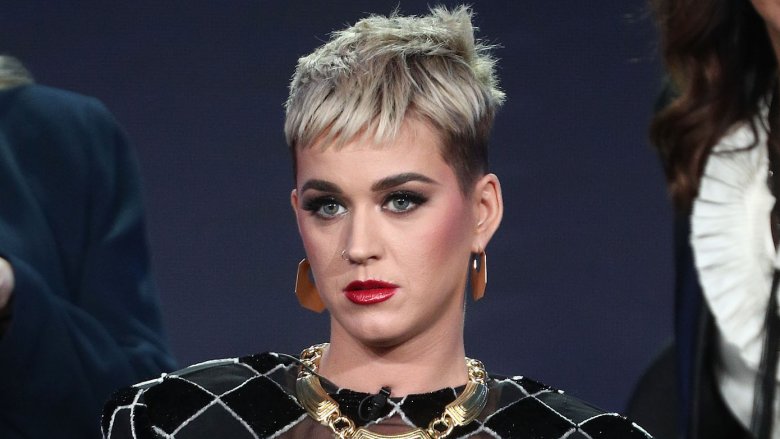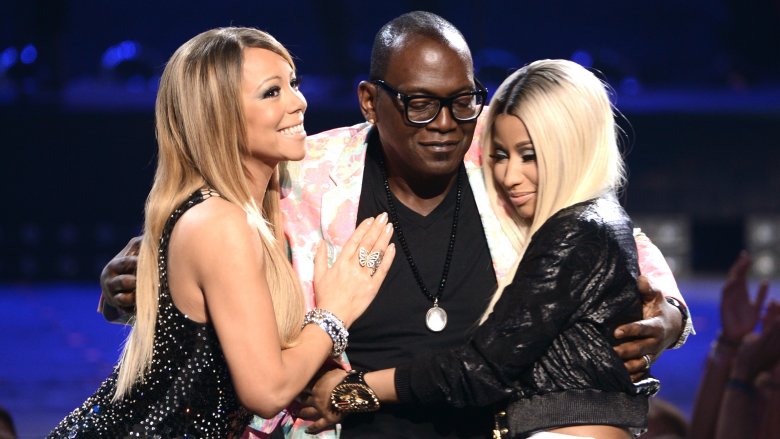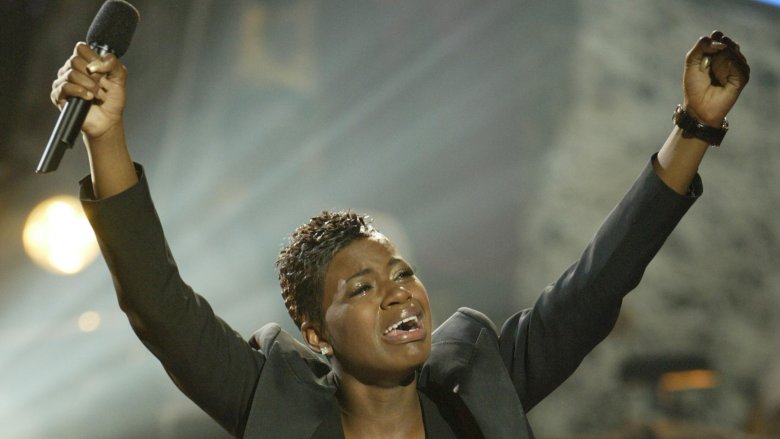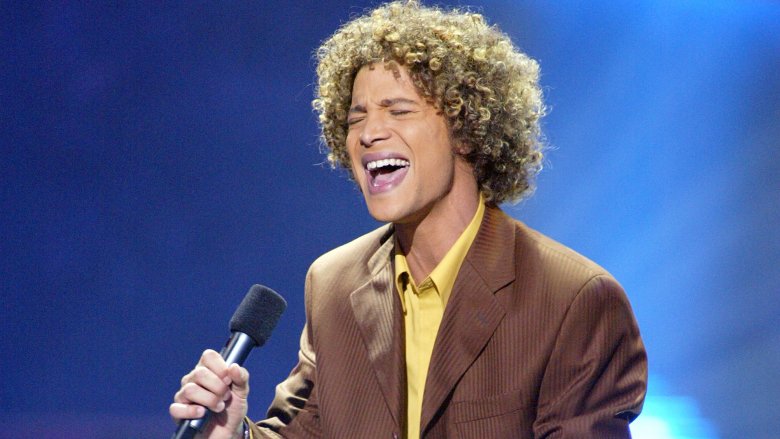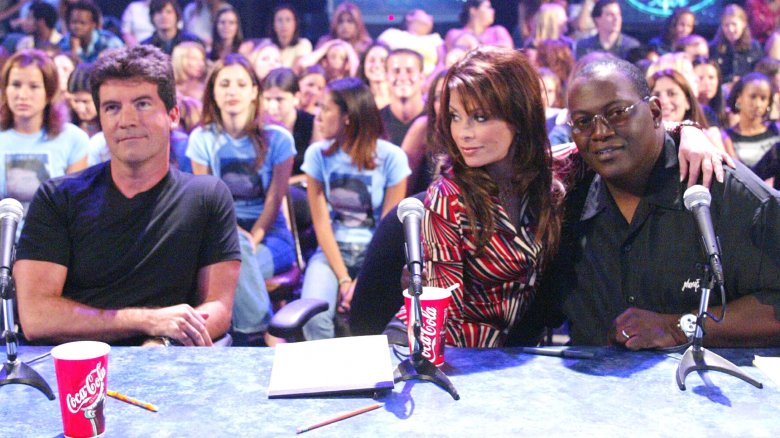Reasons Why American Idol Might Be Fake
The nation became hooked on American Idol when it made its debut on Fox in 2002. The singing competition featured an array of talented entertainers ... as well as a few contestants who definitely could've used some voice lessons. Either way, we fell in love with the winners, from Kelly Clarkson, to Fantasia Barrino, to Carrie Underwood. Even a few of the runner-ups won us over, as well (hello, Clay Aiken!).
But over time, something shady started to happen. The show — which appeared to be so authentic when it first aired — took a weird turn. Suddenly, we weren't entirely sure that the competition wasn't staged and the votes weren't rigged. Why were we so skeptical?
Intel from former contestants and anonymous sources points toward the show being rigged. Along with the show's reboot in 2018, which included a drastically different judging format, it's safe to say that American Idol might be totally fake. Don't believe us? Here are all the reasons why.
The mockery will not be televised
One of the best things about the original American Idol was the hilarious singers that were, shall we say, lacking in the musical talent department. From contestant William Hung's off-key rendition of Ricky Martin's "She Bangs" to General Larry Platt's LOL-inducing original song, "Pants On the Ground," these misfired auditions were what made the show i-c-o-n-i-c.
According to The New York Times, Fox canceled the show in 2016, but it was picked back up by ABC for "the 2017-18 television season." Upon its triumphant return to our living rooms, not only did the program bring on Katy Perry, Luke Bryan, and Lionel Richie as judges, but the pee-in-your-pants hilarious auditions from the not-so-good American Idol hopefuls had been scrapped. But why? The program's showrunner, Trish Kinane told The Hollywood Reporter, "It doesn't feel comfortable to put borderline unstable people up on stage and laugh at them." She added, "We want the humor, but we don't want the exploitation."
Okay, fine. But the eccentric contestants are what made the show so entertaining, and with the revival straying away from that formula, many longtime viewers were ticked off to the max. "The judges of American Idol are boring," one viewer tweeted, in part. "They lack the chemistry and spontaneity. Everything seems scripted– from their jokes, critiques and their interaction with contestants."
Another critic tweeted: "American idol is so staged it's almost awkward to watch."
Welp, America has spoken, and the consensus is: the show is fakety-fake-fake!
Even this former judge thinks it's fake
After a few shake-ups at the judges' table, Mariah Carey, Nicki Minaj, and Keith Urban joined OG host Randy Jackson in 2013. Carey and Minaj didn't last long, though, and they both left the program after just one season, Deadline reports.
During their time on the series, the two women bumped heads multiple times, pulling the focus away from the contestants and the grueling competition, and shining a spotlight on their feud, which E! News was so gracious to break down for us. Years later, in 2015, Carey appeared on Australia's Kyle and Jackie O radio show and was asked if she would return to American Idol for its final season on Fox. She answered defiantly, "Hell no! Absolutely not! That was the worst experience of my life." She then addressed the speculation that her beef with Nicki Minaj was orchestrated to boost the ratings, and that prompted her to call the show "so boring and so fake." Carey added, "You have to make up things to say about people [...] Half the time the performances are good. You'd just be like, 'It was good!'"
The diva has spoken, and we believe her 100 percent!
It's all about the sob story
We've heard it all, from Kalifa Wilson, the homeless performer whose church ponied up the cash for her to travel to the audition, according to CBN, and Wade Cota's harrowing tale of physical abuse at the hands of his biological father. These heartbreaking backstories can bring tears to anyone's eyes within seconds, but is it all a ploy to pull on our heartstrings? You betcha ... well, that is, according to former contestant Michael Barnum.
In an essay written for Medium, Barnum reflected on the time he auditioned for the show, which dated back to August 2017 when he was asked "to answer a questionnaire" to help build up the "beginning elements" of his backstory.
Barnum was later interviewed on camera by a producer, where he shared that he had quit his job a few weeks prior and only had $100 to his name. He also told the producer that his grandfather had been fighting for his life in the hospital. The footage was reportedly shown to the program's executive producers, who gave Barnum the thumbs up to audition in front of the judges. But wait, we thought this was a singing competition, not a "who has struggled the most" contest?
Nonetheless, Barnum's recount mirrored that of Season 8 contestant Ju'Not Joyner who told ABC News the audition process and contestants' stories made for "good TV" because it was "like Maury Povich or something."
The golden ticket means nothing
When a contestant wows the judges in their home state or wherever they choose to audition, they receive a golden ticket and are invited to fly out to Hollywood to appear on the show, right? Well, that's how we always thought the process went, but it's not as straightforward as that. When successful Texan contestant Akron Watson mysteriously disappeared from Season 6 of the show, he posted on his MySpace page (via E! News): "A golden ticket, but no plane ticket!!!"
He added that two days before he was scheduled to fly out to Hollywood, he received a phone call announcing he had been cut from the show for "unknown reasons." A publication called Pegasus News (via E! News) later revealed Watson failed to mention he had a criminal record that included a "marijuana bust." E! News added, "Watson can't say for sure that his record led to his dismissal. But he can't for sure that it didn't."
This rumor definitely hurts Idol's credibility. Shouldn't the show's producers investigate a contestant's past before they get their hopes up of going to Hollywood? We think so.
A forced musical selection
After snagging a spot on American Idol, contestants perform a song every week that will hopefully impress the judges and save them from being eliminated. While their song selection isn't made off the cuff, they're limited as to what they can and cannot perform. According to Today, as of 2008, after the theme for the week is revealed, contestants are given "a sampling of songs on a CD," which includes "around 50 songs" to choose from.
So what's the deal with the sparse selection? Today reports the available songs are cleared ahead of time and producers are given permission to have the song performed on the show. They also want to ensure the track is a song that isn't "too obscure" for the audience.
Surely this process of handing out CDs has changed with the times, but the limited amount of pre-approved songs to choose from is likely still a thing. It kind of takes the fun out of the competition knowing the show has already pre-arranged which songs can be performed and which ones can't, no?
Letter-coded rejections?
A woman who goes by the name of Maria Saint revealed on her blog, True Dat 504, that while auditioning for Season 10 in New Orleans, each contestant received a letter-coded golden ticket that producers use to judge how talented they are.
There are reportedly three letters used: N, K, and Y. The Y is a "yes" for good singers. The K is for a "keeper," who's also a good singer but not as "impressive as Y's." As for the "N" — that was for the people who were "bad." Saint wrote, "You're not a bad person and you may not even be a bad singer but in the idol world you are a bad singer to them and that's what you're going to be made to be."
She warned future contestants that if they received a paper with an "N" on it, but they still wanted to go through the process, they would need to be prepared to "be humiliated." She added, "But, I promise you, if you are marked as an N, they already have their minds made up about you and it will not change. If you make it through to the end you will be presented unfavorably." Ouch.
This coding system has likely changed now that the show no longer highlights those whose voices are less than stellar, but it just goes to show you how orchestrated and staged the entire audition process once was.
Producers manipulation
In 2013's Elimination Night: A Novel (via the New York Post), the book's anonymous author creates a fictional series called Project Icon to cast some very real shade at American Idol. According to the Post, the author had first-hand "knowledge of the inner workings of a top TV talent show," which was presumed to be Fox's juggernaut singing competition.
Via the newspaper's summary, the book's fictional producers manipulate contestants before they appear in front of the judges. Singers are allegedly told "the very opposite of the truth" to psyche them out. The newspaper added, "So, if the singer is incredible, the producers tell her that she's probably not moving on. If he stinks, well then they tell him he's the next Otis Redding." What's the point? To ratchet up the drama. Duh.
Not only that, the judges (who very closely resemble then-judges Randy Jackson, Steven Tyler, and JLo) are allegedly taught how to keep a tight poker face and give "negative signals," such as "wringing their hands or shaking their heads" while some of the better contestants are auditioning in order to increase the tension.
Basically, if the novel's fictional portrayal is even remotely like the real thing, the producers and judges are a bunch of cold-hearted snakes. But it's all in the name of good entertainment, right? We guess.
A case of alleged rigged voting
One of the most controversial voting results occurred in Season 8 — a shady incident that will forever be known as "textgate." With Kris Allen and Adam Lambert as the last two contestants standing, Allen was victorious after he was the "unwitting beneficiary of tens, if not hundreds, of thousands of illegal block votes cast" allegedly provided by the show's "communications partner," AT&T, according to The Arkansas Democrat-Gazette (via NZ Herald).
According to the source, residents of Allen's hometown of Jacksonville, Ark. were given "free mobile phones and texting services" ahead of the show's final episode. Allen's fans were also allegedly instructed on how to send "10 or more votes at the touch of a single button," with one woman even claiming she voted for the hometown hero "10,840 times." The phone company issued an apology, claiming their employees were simply "caught up in the enthusiasm," but the network later went on the record to claim Allen had won fair and square in a statement by Fox and the show's production companies (via CNN).
That ended Idol 's alleged voting shenanigans, right? Not according to one angry Twitter user who couldn't believe when fan favorite Gabby Barrett lost on the show's reincarnated version for ABC. "Not only is American Idol rigged but Gabby not winning is the biggest upset of 2018," the disgruntled fan wrote. Granted, there haven't been any vote-rigging accusations since "textgate," but at this point, are we putting anything past them?


